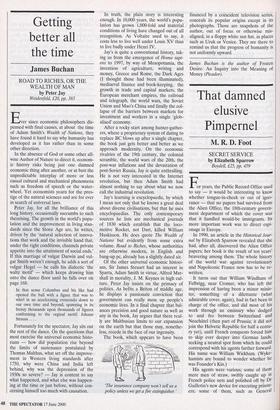That damned elusive Pimpernel
M. R. D. Foot
SECRET SERVICE by Elizabeth Sparrow Boyden, £25, pp. 459 or years, the Public Record Office used to say — it would be interesting to know whether tongue-in-cheek or out of igno- rance — that no papers had survived from the Alien Office, the 18th-century govern- ment department of which the cover was that it handled would-be immigrants. Its more important work was to direct espi- onage in Europe.
In 1990, an article in the Historical Jour- nal by Elizabeth Sparrow revealed that she had, after all, discovered the Alien Office papers; her book is the result of ten years' beavering among them. The whole history of the world war against revolutionary and Napoleonic France now has to be re- written.
It turns out that William Windham of Felbrigg, near Cromer, who has left the impression of having been a minor minis- ter, something of a dilettante (what admirable cover, again), had in fact been in charge of the office, and did most of his work through an emissary who dodged to and fro between Switzerland and Neuchatel (then part of Prussia; it did not join the Helvetic Republic for half a centu- ry yet), until French conquests forced him to skip ever deeper into German lands, seeking a neutral spot from which he could correspond with his agents farther forward. His name was William Wickham. (Wyke- hamists are bound to wonder whether he was Founder's Kin.) His agents were various; some of them mere men of straw, swiftly caught up in French police nets and polished off by Dr Guillotin's new device for executing prison- ers; some of them, such as General Pichegru, the conqueror of Holland, in high positions and entertaining the full confidence of the Committee of Public Safety (so far as that body trusted anybody at all), well before Pichegru let his monar- chist views go public. Some of them got entangled in Cadoudal's plot to assassinate the First Consul, young General Buonaparte. Word of this got as high as King George III him- self, who belonged to the tiny inner circle that was kept fully informed; he put out a formidable directive that this was not the way heads of state were to treat each other — though this does not seem to have kept some of his ministers from having a distant hand in the assassination of Tsar Paul I of all the Russias.
Over this patch of thin ice Elizabeth Sparrow skates discreetly; the rest of her book is wonderfully forthcoming. She pro- duces several possible characters for the original Scarlet Pimpernel, and shows on her dust-cover a little ivory triangle, with three scarlet pimpernels on it, which would see anybody safely through British immi- gration control if topped with a golden guinea.
Buonaparte, on his way to becoming the Emperor Napoleon, turned sternly anti- British, a sentiment held to some extent in check by several of his senior police offi- cers (including the unspeakable Fouche) Who — unknown, of course, to him — were receiving British secret service money. (It came off the foreign office's vote.) As in the 1940s, the French police were not up to an adequate control of the coasts; there was a fairly constant to-and-fro across the Channel. The Emperor had been deeper, through discreet intermediaries, in talks With the British in the 1790s than his admirers will want to know; all that van- ished when a bomb went off near his coach as he was on his way back to the Tuileries after a performance of Handel's Messiah (then, as later, music knew few frontiers). Mrs Sparrow shows an intricate grasp of the ins and outs of which agents could be trusted and which were dubious (as always, some adventurers went into espionage for the money, rather than because they meant it). In that great war, as well as both the 20th century's great wars, double agents as well as reliable spies abounded. It has been a tremendous intellectual feat, comparable to what Wickham managed at the time, to master such a myriad of pseudonyms. At the peace of Amiens Wickham was Moved on, via a short spell as chief secre- tary for Ireland, to be a junor whip; the Whole business was restarted, under fresh management, when the great war restarted too. Mrs Sparrow stays with it to the end, covering the minutest details, and being as straightforward as any reader could wish in explaining when she knows, and when she has to conjecture. This is both a fine piece ef secret service history and a most read- able account of human beings under pres- sure.











































































 Previous page
Previous page